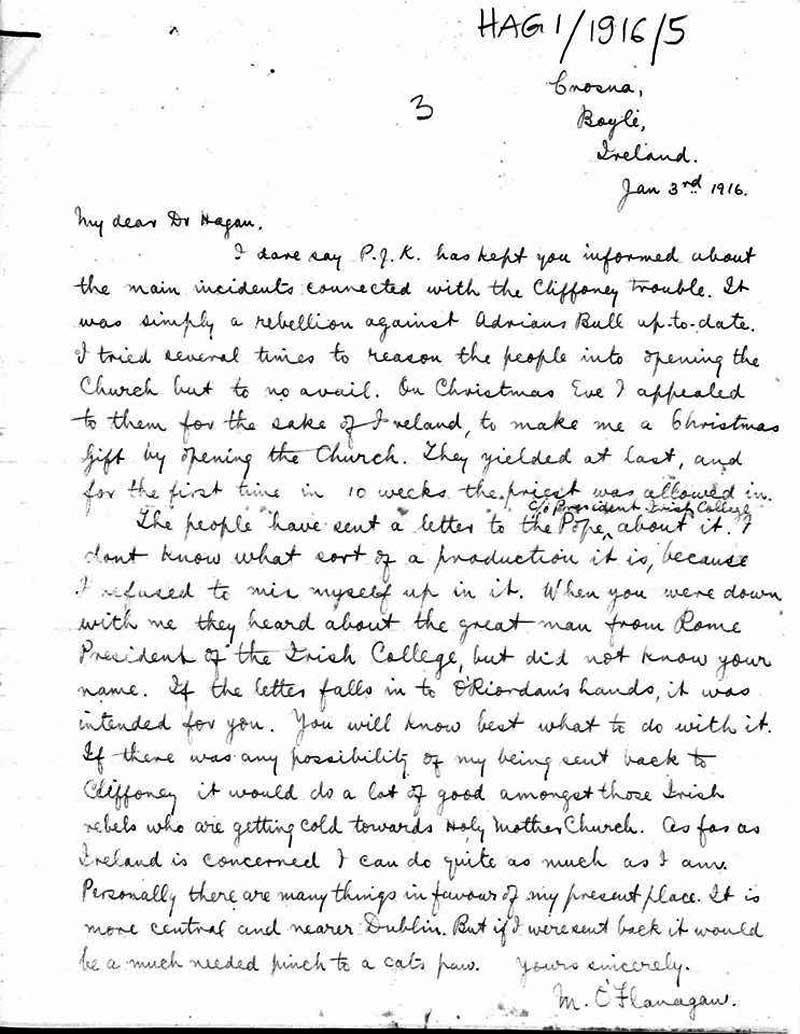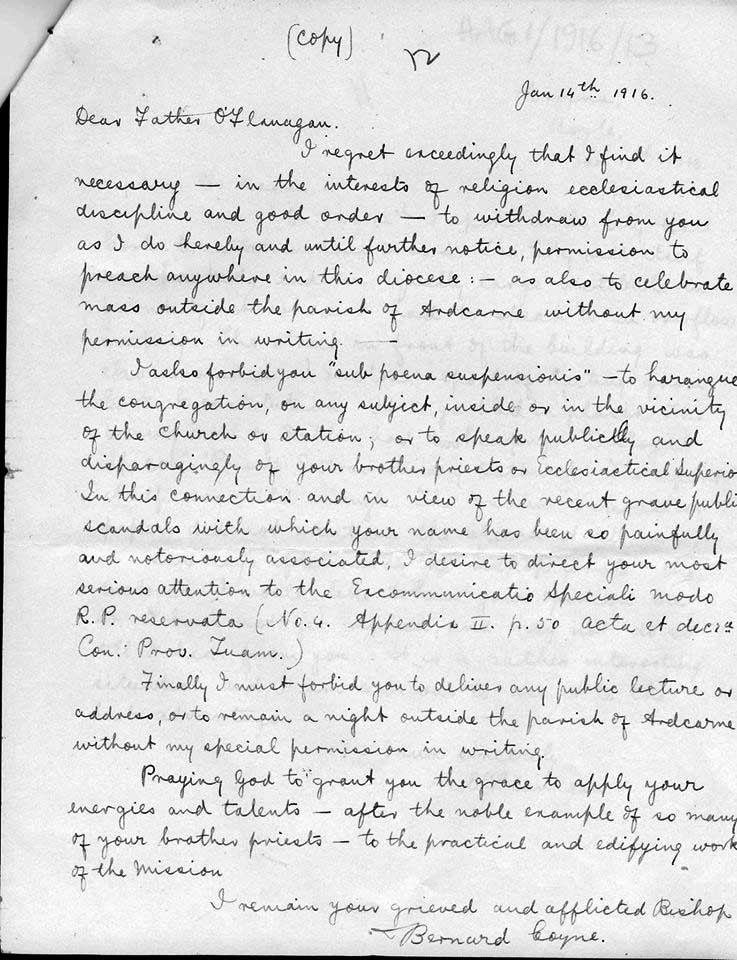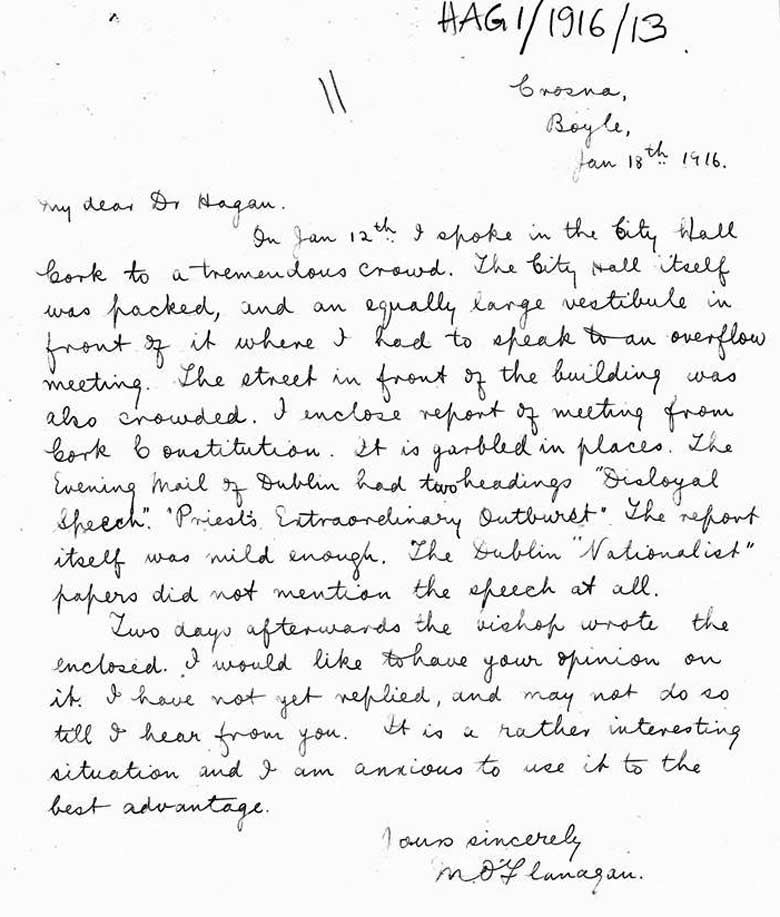
Crossna,
Boyle,
Ireland
Jan 3rd 1916
My dear Hagan,
I dare say P. J. K. has kept you informed about the main incidents connected with the Cliffoney trouble. It was simply a rebellion against Adrian's Bull up-to-date. I tried several times to reason the people into opening the church but to no avail.
On Christmas Eve I appealed to them for the sake of Ireland, to make me a Christmas gift by opening the church. They yielded at last, and for the first time in 10 weeks the priest was allowed in.
The people have sent a letter to the pope c/o President of the Irish College about it. I don't know what sort of a production it is, because I refused to mix myself up in it. When you were down with me they heard about the great man from Rome President of the Irish College, but did not know your name.
If the letter falls into O'Riordan's hands, it was intended for you. You will know what to do with it. If there was any possibility of being sent back to Cliffoney it would do a lot of good amongst the Irish rebels who are getting cold towards Holy Mother Church.
As far as Ireland is concerned I can do quite as much as I am. Personally there are many things in favor of my present place. It is more central and nearer Dublin. But if I were sent back it would be a much needed pinch to a cats paw.
Yours sincerely,
M. O'Flanagan.
and
Jan 4th 1916.
My dear Dr. Hagan.
On further consideration I think it better to give you the leading facts of the situation that led up to and followed my transfer from Cliffoney.
When transferring me to Cliffoney in July 1914 the Bishop asked me to do what I could to have the Ashley demesne and grass lands divided amongst the people. As it was private property not yet brought by the C. D. B. it was a rather hard thing to tackle. Moreover I found the people more in want of and more eager to get a supply of turf for fuel. The C. D. B. had a bog in Cliffoney. As you know the bog was on the private property of the estate. It was in very ...... ........ ..... ....... ...... Board for distribution amongst the people. That side of the question is fully brought out in the enclosed speech.
Failing to get the Board to do its duty, we went in on the bog and cut the turf. That was of course a technical violation of the law. It was however the only course open to us as an answer to the Boards refusal to do its duty. Our action was approved of by the general public. Even the Unionists of the Conservative Club in Sligo, including both the D. I. and the C. I. of police spoke approvingly of what we had done. The Board would not face a local trial, but summoned us before a Court of Chancery and got an injunction. We made no defense but we violated the injunction in the most open way, by taking away the turf and giving it to the poor. The proper answer to that would have been to send me to goal. But owing to the circumstances of the day that was not considered diplomatic.
Meanwhile individual members of the Board had spoken to the Bishop and suggested that he do them the favor of removing me. He held out till after the tillage meeting in Sligo in the middle of October. At that meeting I appeared in the presence of the Chairman (Canon Doorly of Sligo) T. W. Russell and an assembly of Sligo Shoneens with a few of the proletariat, and pointed out that a tillage movement composed of talk would not do the work. If a tillage movement was really meant, money should be put into it as had been done in the munitions case. I pointed out that the C. D. B. was dividing land so slowly that as far as national regeneration went, it might be almost as well not to be dividing it at all. And so on in the same strain.
That was on a Saturday. On Monday the Bishop wrote to me simply telling me to transfer myself to Crossna. I wrote asking for his reason, but he never replied. I also wrote to the Archbishop about an appeal. He said there was no ground for an appeal.
The fundamental question is whether a priest is accountable to his Bishop for his action in purely political and secular affairs. The Bishops in Ireland have always taken it for granted that they were lords and masters of their priests in everything. My idea would be that the Pope does not dictate to the bishops what attitude they are to take up say to the war and recruiting for the army, so ought the Bishop leave his priests free in the same matters.
Yours v. sincerely
M. O'Flanagan.
Censure by Dr Coyne did little to slow him down; he got himself into trouble almost immediately. On Jan 16th Fr Michael spoke at an anti-conscription meeting in Cork City Hall, which was attended by 1,500 people. The Chairman of the protest meeting was Thomas MacCurtain - who was later assassinated by British forces - while stewarding the 150 Volunteers, 30 of whom were armed, was Terence MacSweeney.
Fr Michael's speech was, to quote Denis Carroll, 'wide ranging, even general. The address dealt with the war cabinet's levy and its damaging effect on the Irish economy. As well, O'Flanagan satirized recruitment advertising and the specious claims about freedom for small nations, the defense of religion, etc, etc, made by propagandists. With his usual mixture of cool analysis and puckish humor, he spoke of the battle of Solonica as a 'fizzle' and the Dardanelles landing as a 'fiasco'. He rejoiced that England had been defeated in its plan for conscription but warned people to remain on guard, to keep their powder dry'. The section of the speech that drew the most hostile criticism bore mildly pro-German overtones.
Fr O'Flanagan had ridiculed the prevalent scare of a German invasion but continued to argue that "they (the Germans) would be no worse than the English"....'.
An anti-conscription meeting organized by the Irish Volunteers at Cork City Hall attracted 1,500 people, and 30 of the 150 Volunteers among them were armed. Fr Michael O'Flanagan, who presided at Jeremiah O'Donovan Rossa's funeral the previous August, was the main speaker. Although his language was 'strongly pro-German', local police surmised it would have little effect. It nevertheless prompted the Daily Express to describe Sinn Féin (of which Fr O'Flanagan would later be president) and the Irish Volunteers as 'a rising force'.
His speech was reported as seditious and pro-German by the RIC. As a result he was disciplined by Bishop Coyne and forbidden from speaking at any meeting outside the boundary of his parish without written permission:
The letter of censure from Dr Bernard Coyne, Bishop of Elphin, dated Jan 14th 1916, to Fr Michael, was written two days after the Cork City Hall speech; the typed version follows: (copy) Jan 14th 1916
Dear Father O'Flanagan,
I regret exceedingly that I find it necessary - in the interests of religion, ecclesiastical discipline and good order - to withdraw from you as I do hereby and until further notice, permission to preach anywhere in this diocese: - as also to celebrate mass outside the parish of Ardcarne without my permission in writing.
I also forbid you "sub poena suspensiouis" - to harangue the congregation, on any subject, inside or in the vicinity of the church or station; or to speak publicly and disparagingly of your brother priests or ecclesiastical superiors. In this connection and in view of the grave public scandals with which your name has been so painfully and notoriously associated, I desire to direct your most serious attention to the Eccommunicto speciali modo R. P. reservata (No. 4. Appendix II. P. 50 aeta et deciu Con. Prov. Tuam.) Finally I must forbid you to deliver any public lecture or address, or to remain a night outside the parish of Ardcarne without my special permission in writing. Praying to God to grant you the grace to apply your energies and talents - after the noble example of so many of your brother priests - to the practical and edifying work of the mission. I remain your grieved and afflicted Bishop Bernard Coyne How did Fr O'Flanagan feel about all this? The following letter to his friend Monsignor John Hagan in Rome was attached to a copy of the Bishop's letter. At the end Fr Michael refers to it as: Dr Hagan was a good friend of Fr O'Flanagan, and their correspondence is preserved in the archives of the Irish College in Rome; in many of the letters Fr O'Flanagan is code named 'Brosna" or 'Brosnon'.
Crossna, Boyle, Jan 18th 1916. My Dear Hagan. On Jan 12th I spoke in the City Hall Cork to a tremendous crowd. The City Hall itself was packed, and an equally large vestibule in front of it where I had to speak to an overflow meeting. The street in front of the building was also crowded. I enclose a report of the meeting from Cork Constitution. It is garbled in places. The Evening Mail of Dublin had two headings "Disloyal Speech". "Priest's
Extraordinary Outburst". The report itself was mild enough. The Dublin "Nationalist" newspapers did not mention the speech at all.
Two days afterwards the Bishop wrote the enclosed. I would like to have your opinion on it. I have not yet replied, and may not do so till I hear from you. It is a rather interesting situation and I am anxious to use it to the best advantage.
Yours sincerely
M O'Flanagan
In the De Valera papers archives in UCD: November 1921– Correspondence, mainly between Fr. Michael August 1922 O’Flanagan, his secretary Thomas (‘Tommy’) D. O’Connor and Stephen M. O’Mara relating to Fr. O’Flanagan’s part in the launching of the Bond Drive, mainly arrangements relating to his proposed promotional tour of various cities in November and December 1921.
Includes: – telegram from Helen Brady to O’Connor stating ‘O’Mara sailed for Ireland January seventh…Prior treaty ratification O’Mara wrote O’Flanagan use own judgement as to movements. Cannot advise on organization work but presume it will be all right. Suggest you communicate with Garth Healy on financial end since bond drive halted’. (12 January 1922, 1p); – document summarising Fr. O’Flanagan’s involvement in the Republican movement used as a press release for a speaking tour of the U.S.A. headed ‘Brief Story of Rev. Michael O’Flanagan’ (n.d., 1p); – telegrams from Thomas O’Connor to P.J. Kerley of Chicago, Illinois on arrangements for Fr. O’Flanagan’s promotional tours in August 1922 (3 items). 21 items
19 February 1921. Typescript carbon copy letter from P.J. Little to an unknown individual advancing reasons for forcing the resignation of Fr. O’Flanagan from the Sinn Féin organisation and suggesting that he be invited to take a prominent part in the White Cross. Initialled and date stamped ‘19 February 1921, 1pm’. Also includes typescript note on first page ‘ 4/4/63. Pres. de Valera called out to Sandyford to see Mr. Little who has been ill. He showed him this letter, and Mr. Little stated that he would like it retained with the President’s documents, and to have a note to that effect put on it.’ 2pp
12 August - 22 December 1971. Holograph letters to President de Valera from J.A. Stuart Watt, Castlewood Park, Dublin 6, enclosing a memorial card of Fr. Michael O’Flanagan who died on 7 August 1942 (with photograph) (1942, 6cm x 9cm) and a booklet The Prophecy of Malachias (n.d., 11pp) prefaced by a reproduction of Fr. O’Flanagan and the words ‘It was one of the last requests of the late Fr. Michael O’Flanagan, before his death, that the young people of Eire should read and study for themselves the Sacred Catholic Scriptures’. 4 items.
'a rather interesting situation and I am anxious to use it to the best advantage'
.

